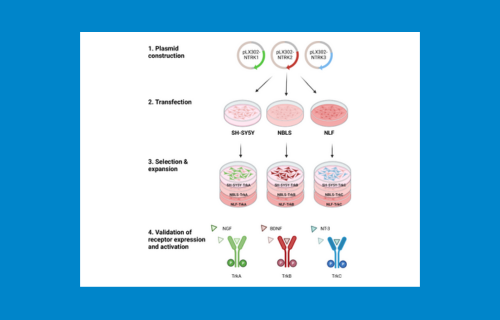Congratulations to UCD School of Medicine, Ms Stephanie Maher  and all the team from the Melinda Halasz Group, based in Systems Biology Ireland, involved in their recently published paper in Scientific Data , titled ‘A temporal (phospho-)proteomic dataset of neurotrophic receptor tyrosine kinase signalling in neuroblastoma’.
and all the team from the Melinda Halasz Group, based in Systems Biology Ireland, involved in their recently published paper in Scientific Data , titled ‘A temporal (phospho-)proteomic dataset of neurotrophic receptor tyrosine kinase signalling in neuroblastoma’.
Dr Halasz commented “Neuroblastoma is one of the deadliest childhood cancers with extreme clinical heterogeneity. Among others, Trk receptors have been implicated in prognosis. When TrkA is expressed, we see spontaneous regression of the tumour, while TrkB expression is associated with aggressive forms of neuroblastoma.
In this paper we mapped the TrkA/B/C-mediated signalling networks in neuroblastoma by using mass spectrometry based -omics approaches. By understanding Trk receptor signalling and its modulation by MYCN status in neuroblastoma; we may develop more effective and less toxic targeted therapies for this challenging childhood cancer.”
Abstract
Neurotrophic receptor tyrosine kinases (TrkA, TrkB, TrkC), despite their homology, contribute to the clinical heterogeneity of the childhood cancer neuroblastoma. TrkA expression is associated with low-stage disease and is often seen with spontaneous tumour regression. Conversely, TrkB is present in unfavourable neuroblastomas that often harbour amplification of the MYCN oncogene. The role of TrkC is less clearly defined, although some studies suggest its association with a favourable outcome. Understanding the differences in activity of Trk receptors that drive divergent clinical phenotypes as well as the influence of MYCN amplification on downstream Trk receptor signalling remains poorly understood. Here, we present a comprehensive label-free mass spectrometry-based total proteomics and phosphoproteomics dataset (432 raw files with FragPipe search outputs; available on PRIDE with accession number PXD054441) where we identified and quantified 4,907 proteins, 16,744 phosphosites and 5,084 phosphoproteins, derived from NGF/BDNF/NT-3 treated TrkA/B/C-overexpressing neuroblastoma cells with differential MYCN status. Analysing our dataset offers valuable insights into TrkA/B/C receptor signalling in neuroblastoma and its modulation by MYCN status; and holds potential for advancing therapeutic strategies in this challenging childhood cancer.
For the full paper see here.